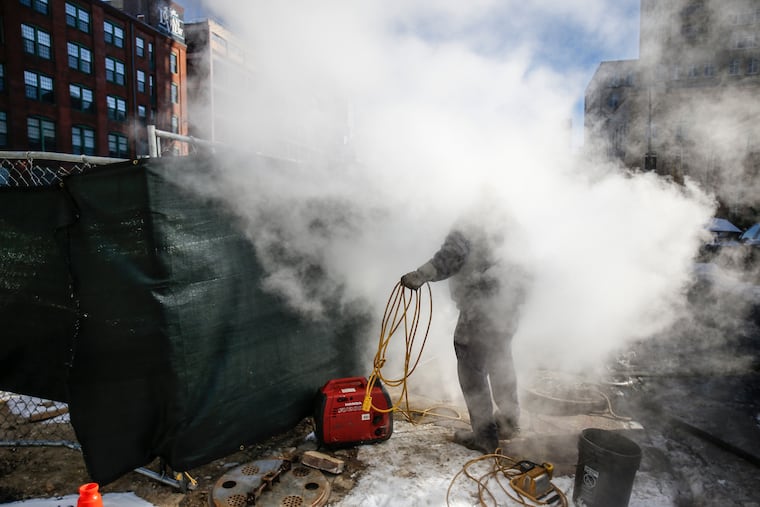Giant Philly steam plant that heats hospitals, Museum of Art, and UPenn has a new owner
A French company, AIP, is buying the Center City district steam heating system, best known for its towering Grays Ferry power plant and sidewalk vapor clouds.

Pennsylvania regulators on Thursday approved the sale of Veolia Energy’s Center City district steam heating system, best known for its towering Grays Ferry power plant and sidewalk vapor clouds, as part of a larger $1.25 billion corporate transaction.
The Pennsylvania Public Utility Commission unanimously approved a settlement with customer advocates that allows the sale of Veolia’s North American district energy systems to Antin Infrastructure Partners (AIP) of Paris, France. The sale was announced in July.
The Center City system generates steam and electricity, and distributes the steam to about 162 customers through underground pipes beneath city streets and sidewalks. It is one of the city’s biggest energy distribution systems, and its customers include office and residential towers, hospitals, and city government buildings, including the Parkway Central Library and the Philadelphia Museum of Art. The University of Pennsylvania consumes much of its output.
Under the settlement, the new owners agreed to retain current employees and not to seek a rate increase before April 1, 2021. The company also committed to a $50 million, five-year capital spending plan for its Philadelphia operations, including its regulated steam distribution system as well as its merchant electricity-producing arm, the Grays Ferry Cogeneration Project.
Veolia, which is also a French company, maintains its North American headquarters in Boston. It operates district energy systems in 10 cities, including Boston, Trenton, Baltimore, Atlanta, Grand Rapids, Mich.; Hickory, Wis., Kansas City, Mo.; and Oklahoma City and Tulsa, Okla.
Besides its Center City facility, Veolia also operates a second generation plant at Ninth and Walnut Streets, from which it supplies Thomas Jefferson University with steam and chilled water for air-conditioning. A third plant, an abandoned hulk at Ninth and Willow Streets, ceased operations 30 years ago and is privately owned.
The Philadelphia system was built by Philadelphia Electric Co. early in the last century, and has gone through several owners in recent decades. Veolia bought it in 2007, and in 2013 completed a $60 million project to convert the Grays Ferry plant at 2600 Christian St. from fuel oil to natural gas, reducing its emissions. The plant is the largest customer on the city-owned Philadelphia Gas Works.
The new owner, Antin Infrastructure Partners, operates 41 district heating and cooling networks (including the Paris La Defense network), 13 energy-from-waste facilities, and provides contracted energy services in France.
Antin opened a North American office in New York in 2018 and acquired FirstLight Fiber, a fiber-optic network provider operating in six Northeastern states.
An earlier version of this story incorrectly stated that the district heating system provides energy to Philadelphia City Hall. Among city-owned buildings, the system supplies steam to the Art Museum, the Parkway Central Library , the Police Administration Building on Race Street, the old Family Court Building on Logan Square, and the Eliza Shirley shelter on Arch Street operated by the Salvation Army. It also supplies backup heat for the Criminal Justice Center. City Hall, the Municipal Services Building and One Parkway Building have been converted to natural-gas boilers.